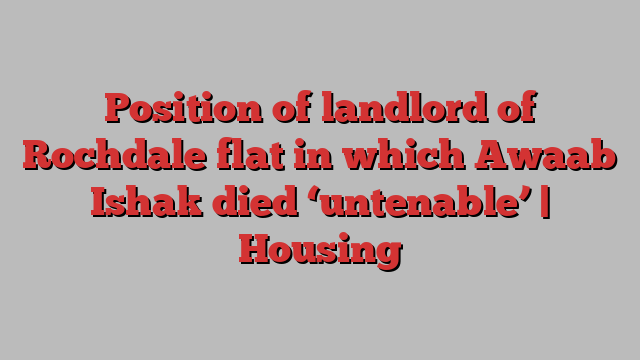
The position of the landlord of the mould-infested Rochdale flat that killed two-year-old Awaab Ishak is “untenable”, a senior government source has said, hours after Gareth Swarbrick issued a defiant statement that he would not quit.
Swarbrick, the chief executive of Rochdale Boroughwide Housing, a social landlord, said late on Thursday “I will not be resigning”, despite a call in parliament for him to stand down and the launch of an investigation into potential “systemic failures” at the organisation.
But in a clear indication the government was unlikely to accept him continuing in his post, the source said: “It is staggering that Gareth Swarbrick is still in a job.”
On Tuesday, a coroner found exposure to persistent black mould on the walls of the family’s rented home was the cause of the infant’s death in 2020 and that the landlord had failed repeatedly to fix it, blaming the mould on “family lifestyle”.
The bathroom had no window, the fan did not work effectively and the window from the kitchen, which had no mechanical ventilation, opened on to a communal hallway. Awaab’s father had been told to “paint over it”.
Michael Gove, the secretary of state for levelling up, housing and communities, told parliament he believed Awaab’s family, originally from Sudan, “were victims of prejudice”.
A local MP also revealed that constituents living in another RBH property this week sent him photos of walls “caked in black mould”, which their doctor concluded made two children “severely ill”.

The housing ombudsman, an England-wide regulator, has announced an investigation into possible “systemic” failings at the social landlord, which looks after more than 12,000 homes.
Swarbrick this week spoke to Gove about Awaab Ishak’s case, after which Gove told parliament: “In the course of that conversation, it became even more clear to me that there are systemic problems in the governance and leadership of that organisation.” Gove previously said “it beggars belief” Swarbrick was still in post.
Swarbrick, who earns £157,000 a year, said in a video statement on Thursday he would not quit and said “the conversation around my position has begun to overshadow the most important part of all of this, which is that a family has lost their child”.
He apologised in the statement “to Awaab’s family for their loss”, before saying the board of the social landlord had given him “their full backing and trust to continue to oversee the improvements and changes needed within RBH”.
In response to the statement, a senior government source told the Guardian on Friday: “‘Rochdale Boroughwide Housing repeatedly ignored a family’s pleas for help, which led to the tragic death of a two-year-old child, Awaab Ishak. It is staggering that Gareth Swarbrick is still in a job. His position is untenable.”
The case has sparked a national debate about standards in social housing and has echoes of the Grenfell disaster, which was preceded by a social landlord failing to properly listen to tenants’ complaints. The coroner, Joanne Kearsley, said Awaab’s death should be a “defining moment” for the UK’s housing sector. About 450,000 homes in England have problems with condensation and mould.
Diane Abbott, the former shadow home secretary, told parliament on Wednesday if the housing chief “had any conscience, he would resign”.
Kelly Darlington, the solicitor for Awaab’s family, said: “I think he needs to take responsibility and there needs to be some accountability from Rochdale Boroughwide Housing overall.”
Swarbrick had said he backed the government’s commitment to “strengthen the Decent Homes Standard and the importance of the tenant’s voice”, adding: “We have made a fundamental change to our disrepair policy. Equity is at the heart of what we do as a mutual housing society and we will continue to strive for greater inclusion and equality.”
In a parallel statement, Alison Tumilty, the chair of the RBH board, said Awaab’s death was “a tragedy of the highest order … We have made mistakes and we are endeavouring to correct them. We have full confidence in Gareth’s leadership. He has the trust of the board. He has extensive knowledge of the sector and the communities of Rochdale.”
It is unclear whether Tumilty had also consulted the landlord’s “representative body”, which includes tenants.